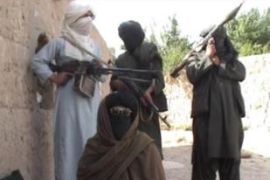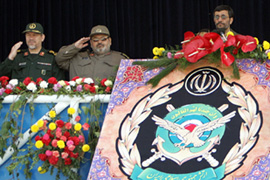US reports sharp rise in ‘terror’
State department report describes Iraq as at the centre of the US “war on terror”.

| Related link |
Of these, attacks in Iraq nearly doubled to 6,630 from 3,468 in 2005 and represented about 45 per cent of the total.
The report described Iraq as at the centre of the US “war on terror”, with US-led forces battling “militias and death squads increasingly engaged in sectarian violence and criminal organisations taking advantage of Iraq‘s deteriorating security”.
The number of “terror” attacks also jumped to 749 from 491 in Afghanistan, where US, Nato and other forces are fighting a revived Taliban offensive more than five years after US-led forces ousted the Taliban from power.
The figures did not include attacks on US troops in Iraq or Afghanistan.
‘State sponsors’
The report listed the five countries that the US describes as state sponsors of terrorism – Cuba, Iran, North Korea, Sudan and Syria.
Venezuela was not added to the list but remained the only other country deemed as “not fully co-operating” with the global fight against terrorism.
 |
| The report claims Iran plans and supports ‘terrorist’ attacks [AFP] |
It singled out Iran as the “most active state sponsor” of terror, accusing Iran of helping plan and foment attacks to destabilise Iraq and derail Israeli-Palestinian peace efforts.
Syria drew similar charges in the report, which also noted the “strong likelihood” of Damascus‘s involvement in the assassination of Rafiq al-Hariri, former Lebanese prime minister, in Beirut in February of 2005.
The report said Iran‘s Revolutionary Guard and intelligence ministry “were directly involved in the planning and support of terrorist acts and continued to exhort a variety of groups, especially Palestinian groups with leadership cadres in Syria and Lebanese Hezbollah, to use terrorism in pursuit their goals.”
In Iraq, it says Iran has played a “destabilising role,” giving material support and guidance to armed Shia groups that have attacked Sunnis, US and Iraqi forces.
At the same time, “Iran maintained a high-profile role in encouraging anti-Israeli activity, rhetorically, operationally and financially,” the report said.
In addition, the report said that Iran is still refusing to identify, try or turn over several senior members of the al-Qaeda network whom it detained in 2003.
Last year, Libya, which had shared the state sponsor of terrorism designation for years, was removed from the list after it renounced terrorism and agreed to abandon its weapons of mass destruction programs in 2003.
Local violence trend
| “We have seen a trend toward guerrilla terrorism, where the organization seeks to grow the team close to its target, using target country nationals”
US state department Country Reports on Terrorism |
The numbers, which are based on “open sources” or public information, were compiled by the National Counterterrorism Center and included in a state department report that provides detailed assessments of such violence around the world.
The report cited some progress in global efforts to combat terrorism since the attacks against the United States on September 11, 2001, including enhanced border security, a crackdown on “terrorist” financing and the dismantling of some violent groups.
But it said because of this, al-Qaeda has adapted, moving toward local violence rather than “expeditionary” attacks like on September 11, where it used foreign recruits to hijack and crash commercial aircraft in the United States.
The report said: “We have seen a trend toward guerrilla terrorism, where the organisation seeks to grow the team close to its target, using target country nationals.
“Through intermediaries, web-based propaganda and subversion of immigrant expatriate populations, terrorists inspire local cells to carry out attacks which they then exploit for propaganda purposes.
“A deeper trend is the shift in the nature of terrorism, from traditional international terrorism of the late 20th century into a new form of transnational non-state warfare that resembles a form of global insurgency.”